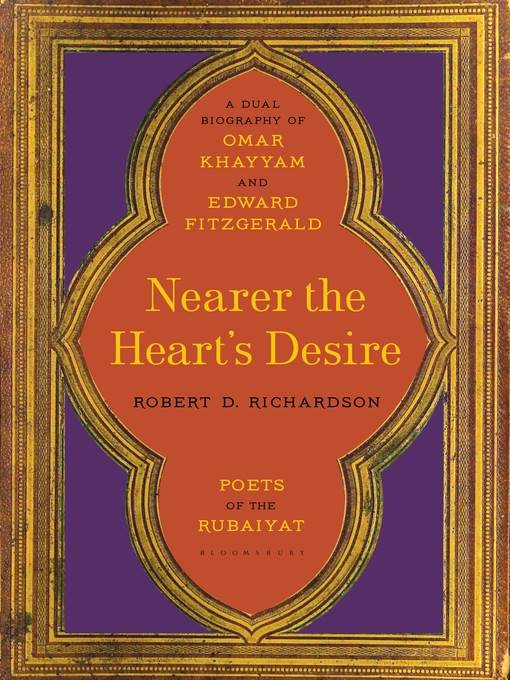
Nearer the Heart's Desire
Poets of the Rubaiyat: A Dual Biography of Omar Khayyam and Edward FitzGerald
کتاب های مرتبط
- اطلاعات
- نقد و بررسی
- دیدگاه کاربران
نقد و بررسی

April 1, 2016
Edward FitzGerald's rendering of the Rubaiyat (literally the "quatrains") of Omar Khayyam brought the 11th-century Persian poet into Western consciousness and established FitzGerald as an important, if subversive, Victorian poet. Historian Richardson, who has written intellectual chronicles of Henry David Thoreau, Ralph Waldo Emerson, and William James (winner of the 2007 Bancroft Prize), here offers a dual biography of the poets and the Rubaiyat. Little is known of Khayyam aside from his fame as an astronomer and mathematician at the high point and decline of Seljuq Persia. Richardson constructs Khayyam's life, setting the quatrains against the thought and actions of his contemporaries. These included Nizam al-Mulk, the prime minister, and Al-Ghazali, the theologian. FitzGerald led a quiet life but had a gift for friendship, including that of William Makepeace Thackeray, Alfred Lord Tennyson, and Thomas Carlyle. As with Coleman Barks's translations of Rumi, FitzGerald's pruned, edited, and concentrated interpretations of the original Persian text capture the living poet rather than the dead language. Khayyam's evocation of love and companionship in a transient and unstable world appealed to FitzGerald's own social and sexual ambivalence and Lucretian Epicureanism. VERDICT This concise, stimulating, and fluent book is highly recommended.--Thomas L. Cooksey, formerly with Armstrong Atlantic State Univ., Savannah
Copyright 2016 Library Journal, LLC Used with permission.

March 7, 2016
Biographer Richardson (William James: In the Maelstrom of American Modernism) makes a noble but not wholly successful effort to unite the stories of the great 11th-century Persian poet Omar Khayyam and the 19th-century Englishman who translated him. The first section, dealing with Khayyam, feels sketchy, partly because concrete facts about him are few; indeed, he may not even be responsible for all of the poems credited to him. Consequently, Richardson tries to describe Khayyam’s milieu, though in somewhat cursory fashion. The book’s second half, on translator Edward FitzGerald, finds Richardson on firmer ground, with more source material available to him. FitzGerald was a “perpetual student” who learned Persian for what would be his life’s defining project: a translation of Khayyam’s collected poetry, published with great success in 1859 as The Rubaiyat of Omar Khayyam, which FitzGerald revised continually until his death in 1883. Richardson’s portrayal of the Victorian writer and his era is lively, but his examination of Khayyam and the world of medieval Persia offers a tantalizing opening for further studies. Illus.

April 15, 2016
A biographer and former professor examines the texts and contexts of Edward FitzGerald's 1859 translation of Omar Khayyam's medieval quatrains, initially ignored but later a worldwide publishing success.Richardson (Splendor of Heart: Walter Jackson Bate and the Teaching of Literature, 2013, etc.), a winner of the Bancroft Prize, is uniquely qualified for his task. The biographer of William James, Thoreau, and Emerson and editor of anthologies of poetry, Richardson compresses these two lives into fewer than 200 tight pages, but the compression generates significant light. He acknowledges that little is known about Khayyam, but he weaves some significance from the few threads that remain. Born to a tentmaker in 1048, Khayyam later became involved with some powerful Persians and wrote myriads of quatrains, some finding their ways to the Bodleian Library, where FitzGerald (1809-1883) found them. Fascinated by what he found, he studied Persian with a friend and spent much of the rest of his life translating and tinkering. He lived to produce several editions of his book. Richardson writes about the life of each man, revealing in his sections about FitzGerald an astonishing series of influences and friends, including Thackeray, Tennyson, Carlyle, and others. The author is also curious (though not excessively so) about FitzGerald's sexuality--he had a brief marriage but far preferred the friendship of men. Richardson ruminates about the nature of translation, noting that Khayyam's quatrains were self-contained, not linked in a narrative, a situation that FitzGerald altered. The author credits FitzGerald for making the verses appeal to all sorts of modern (and, now, contemporary) readers. Finally, he lists what he sees as the values of the work--among them, its "ungendered vision of love" and its hope that maybe we can all get along. An artful analysis of the lives of two poets separated by centuries, geography, and culture, united by hope.
COPYRIGHT(2016) Kirkus Reviews, ALL RIGHTS RESERVED.

June 1, 2016
The most successful book of poetry in English is a translation. Long out of academic favor, its sensuously romantic fatalism still wins new fans. It's The Rubaiyat of Omar Khayyam, of course, an ordered selection of Persian quatrains (ruba'i in Persian) attributed to mathematician-philosopher Omar Khayyam (10481131). The selection and ordering were done by Edward FitzGerald (180983), friend from youth of Thackeray and Tennyson and wealthy enough to pursue the life of a gentleman literary translator and yachtsman, so unobtrusively that only with the publication of his letters six years after his death was there any public knowledge of him. FitzGerald's obscurity contrasts starkly with Khayyam's presence in the tumultuous Seljuk court, as Richardson's graceful, sympathetic accounts of, first, the Persian and then the Englishman let readers discover by themselves. Both men were religious and philosophical outliers from their cultures, Omar gravitating to Sufism, FitzGerald to Epicureanism via Lucretius. Richardson treats both with restrained candorwisely, for Khayyam may not have written any Persian verses at all, and FitzGerald was probably a repressed homosexual.(Reprinted with permission of Booklist, copyright 2016, American Library Association.)

























دیدگاه کاربران